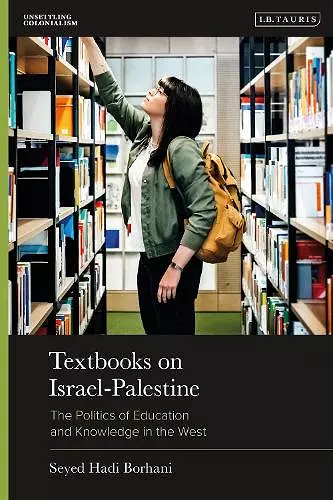Textbooks on Israel-Palestine
The Politics of Education and Knowledge in the West
Format:Hardback
Publisher:Bloomsbury Academic
Published:24th Feb '22
Currently unavailable, and unfortunately no date known when it will be back

Based on analysis of the most important and widely used textbooks in Western academia, this book reveals the partial way in which the Arab-Israeli conflict is narrated in the West
How is the Israel/Palestine question narrated in Western academia? What ideas dominate the key textbooks on the subject and what is presented as 'truth'? This book answers these critical questions.
It is widely known that Western support of Israel played a vital role in the realization of Zionist objectives in Palestine. But academic support of Israel in the West has been a neglected issue, with Western academic knowledge being regarded as impartial and objective. This book reveals that this understanding of Western academic knowledge is wrong when it comes to the Israel/Palestine question. Rather, knowledge has been biased, misleading, and dogmatic and Western college students are subscribing to ‘factual histories’ based on theories at best, if not fiction.
The book is the first empirical investigation able to document this partial reporting of history. Seyed Hadi Borhani examines the most popular college-level textbooks used to teach the history of the Israel/Palestine in Western universities, combining ‘textbook analysis’ (to determine how the dominant academic texts report the question) and a ‘context analysis’ (to identify who 'manufactures' the dominant knowledge). The book provides a historical map of how the Israel-Palestine conflict is understood in the West. The book can be used as a critique for students and professors to use alongside textbooks and is a vital and much-needed intervention into the state of affairs in Western academia.
This is an overdue and brilliant research into the battle of narratives on Palestine in Western Europe. Textbooks and educational curricula have for decades been loyal to the Israeli narrative and ignored the Palestinian suffering and struggle since 1948. This is a highly professional and incisive analysis of how knowledge production in West Europe shapes the power relations on the ground in Palestine. A must read for educationalists, academics at all levels and the wider audience who care about Palestine and the Palestinians. -- Ilan Pappe, University of Exeter, UK
This erudite, insightful and brilliant critical analysis of the politics of education and knowledge in the West fully meet the challenge of its pivotal research question, namely: The perplexing paradox of "how Western countries, the same countries that have established the widest and most influential civilization in history in all its post-Renaissance magnificence – its modern education, knowledge, democracy, rule of law and human rights in particular – could at the same time support such injustice in Israel-Palestine– a fundamental source of so much crime and misery in the Middle East. Critically exposing, demystifying and debunking the ideological, political – nay, normative personal - underpinning of Western knowledge when it comes to Israel, this work is a required entry in all academic Middle East history, politics and social science/education reading lists.'
-- Dr Uri Davis, AL-QUDS University, PalestineThis is an important book, full of important material and measured in its judgments. A fascinating and indispensable contribution to the understanding of the relationship between politics and education. -- Shlomo Sand, Tel Aviv University, Israel
The unprincipled, misguided support offered by western nations to Israel is far from an accident of history, or the result of the whims of this or that leader or politician; it is the result of long-term, racist and colonial attitudes persisting in western education systems, favouring the Zionist settler colonial project and denying the indigenous Palestinian narrative, as argued convincingly in this innovative work by Hadi Borhani -- Haim Bresheeth, SOAS, UK
A valuable analysis of college textbooks that are educating – or in most cases, miseducating – American students on Israel-Palestine -- Alison Weir, USA
This book is well-researched and lucidly written to unravel the subtle biases in popular books used in teaching the history of the Arab-Israeli conflict in major English-speaking Western countries. This book is a must-read for scholars and the general audience unfamiliar with the sensitivities and sensibilities affecting the subject matter -- Ali R. Abootalebi, University of Wisconsin, USA
History, it is often said, is written by the winners. Textbooks on Israel-Palestine shows how the academic narrative of that conflict – and the production, reproduction, and dissemination of knowledge of it – has become both blatantly and subconsciously political, skewing our understanding and retelling of it. This is a book of tremendous value. It should be read by all university professors teaching courses on the Palestinian-Israeli conflict.
-- Mehran Kamrava, Georgetown University Qatar, QatarDr Borhani’s study of the six books on the Israel/Palestine question most used by colleges in the UK and other Anglophone countries finds that all but one adopt the Israeli narrative of ‘return’. It is a significant contribution to our understanding of education and ‘public opinion’, and how both are formed and misinformed by scholarly bias.
-- Rosemary Sayigh, author of Palestinians: From Peasants to RevolutionariesDespite the difference in our perspectives and my respectful disagreement with some of Professor Borhani’s assessments, it's clear that his book provides valuable information and many thoughtful insights. I strongly recommend it to readers, particularly instructors, with an interest in the Israeli-Palestinian conflict -- Mark Tessler, University of Michigan, USA
“This book illuminates the Israeli success over the decades in manipulating the devastating story of how denials of Palestinian basic rights was partly accomplished by warping student minds forced to learn about the conflict through slanted textbooks validating the Zionist narrative. Such textbook propaganda is not a trivial sideshow as struggles of this kind are usually decided on the symbolic battlefields of the mind. Borhani’s book compels the reader to grasp why distorted storytelling functions as an insidious weapon of oppressors.” * Richard Falk, Princeton University, USA *
ISBN: 9781350233089
Dimensions: unknown
Weight: 549g
264 pages